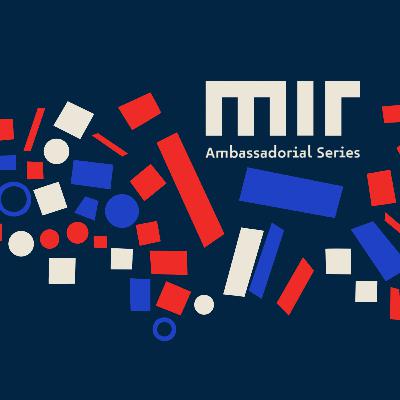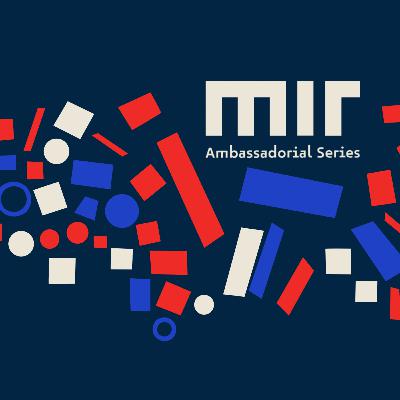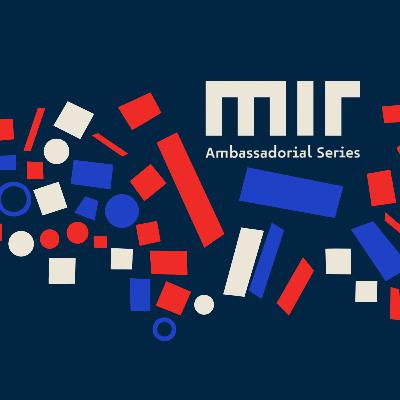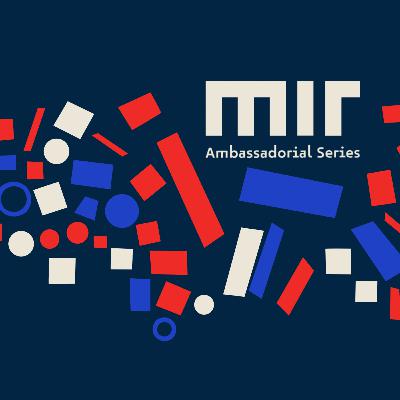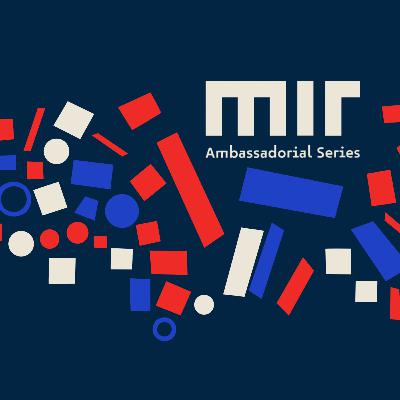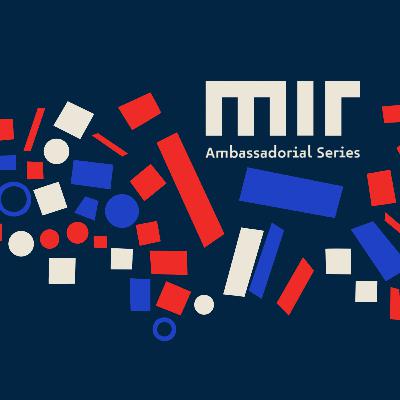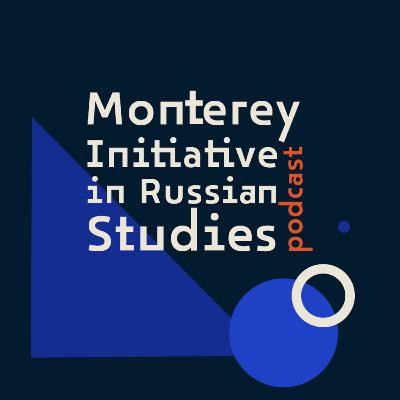Discover Monterey Initiative in Russian Studies Podcast
Monterey Initiative in Russian Studies Podcast

Monterey Initiative in Russian Studies Podcast
Author: Monterey Initiative in Russian Studies
Subscribed: 13Played: 341Subscribe
Share
© Monterey Initiative in Russian Studies
Description
The Monterey Initiative in Russian Studies at the Middlebury Institute enables students with advanced Russian language skills to professionalize their interest in Russia and Eurasia. This podcast showcases the projects of the Monterey Initiative: Monterey Summer Symposium on Russia, Monterey Conversations, The Ambassadorial Series, and the Monterey Symposium | The World. Support for the Monterey Initiative in Russian Studies is provided by Carnegie Corporation of New York. © 2022 President & Fellows of Middlebury College
62 Episodes
Reverse
Professor Serhii Plokhii, Director of Harvard University’s Ukrainian Research Institute, discusses the competing narratives surrounding Ukraine’s national identity – both their historical origins and their modern implications. This is Part 1 of a three-part lecture series, "Understanding Ukrainian History" which serves as an introductory module to the Monterey Summer Symposium on Russia. Recorded via Zoom on June 22, 2022.
"But I think what I learned, perhaps it's most significant, I took away lessons that I think are valid all the way through all of my experience, were two or three important things. One, that Russia has its own culture, history, interests, values, and so forth. And they are not Americans. They are different from America. Their experience is different. Their geography is different. They face different issues. They have different aspirations in many ways. And that one has to start with the premise that you respect that." - Ambassador James F. Collins
The Monterey Initiative in Russian Studies at the Middlebury Institute introduces The Ambassadorial Series: Deans of U.S. - Russia Diplomacy, Part Two of The Ambassadorial Series. Part Two consists of six plus hours of conversations with Ambassadors Jack F. Matlock, Thomas R. Pickering, and James F. Collins about crucial events and developments in U.S.-Russia relations. Focusing on the 1990s – from the disintegration of the USSR to President Putin's ascent to Russia’s highest office a decade later, Part Two, hosted by Dr. Hanna Notte, continues to offer firsthand accounts and analyses of the cataclysmic changes that transformed Russian politics and society.
"Yeltsin was in a bit of a corner in all of this. I think he himself felt it was an absolute disaster to use a military option against Serbia. Now, were we prepared for this. Were the Americans, I think, sensitive enough to what this was going to mean? No, they weren't. I'm not sure we at the embassy even understood how deeply the reaction was going to go or how effective the people who were Yeltsin's critics were going to be in using what we did in Serbia against him and against the, if you will, the Westerners, but they were and it put them on the defensive and it made it very difficult for the Yeltsin team for quite some time." - Ambassador James F. Collins
The Monterey Initiative in Russian Studies at the Middlebury Institute introduces The Ambassadorial Series: Deans of U.S. - Russia Diplomacy, Part Two of The Ambassadorial Series. Part Two consists of six plus hours of conversations with Ambassadors Jack F. Matlock, Thomas R. Pickering, and James F. Collins about crucial events and developments in U.S.-Russia relations. Focusing on the 1990s – from the disintegration of the USSR to President Putin's ascent to Russia’s highest office a decade later, Part Two, hosted by Dr. Hanna Notte, continues to offer firsthand accounts and analyses of the cataclysmic changes that transformed Russian politics and society.
"No Assistant Secretary ever suggested that to me before. I don't think I'd ever approached the question of writing the president United States a personal message from overseas. But Strobe believed that my judgment would be useful to the President, and that was, in itself, an honor." - Ambassador Thomas R. Pickering
The Monterey Initiative in Russian Studies at the Middlebury Institute introduces The Ambassadorial Series: Deans of U.S. - Russia Diplomacy, Part Two of The Ambassadorial Series. Part Two consists of six plus hours of conversations with Ambassadors Jack F. Matlock, Thomas R. Pickering, and James F. Collins about crucial events and developments in U.S.-Russia relations. Focusing on the 1990s – from the disintegration of the USSR to President Putin's ascent to Russia’s highest office a decade later, Part Two, hosted by Dr. Hanna Notte, continues to offer firsthand accounts and analyses of the cataclysmic changes that transformed Russian politics and society.
"When Russian tanks went on the bridge over the Moscow River and fired at the Russian White House on October 3rd of 1993, the first thing that popped into my mind was, 'Are we going to have a civil war in Russia? And is it going to be as disastrous for the country as the civil war between the Reds and the Whites was after the end of the First World War and the beginning of the communist state?' I had a worry about that, that I don't think was misplaced. It was something that we all thought of as being a very damaging situation." - Ambassador Thomas R. Pickering
The Monterey Initiative in Russian Studies at the Middlebury Institute introduces The Ambassadorial Series: Deans of U.S. - Russia Diplomacy, Part Two of The Ambassadorial Series. Part Two consists of six plus hours of conversations with Ambassadors Jack F. Matlock, Thomas R. Pickering, and James F. Collins about crucial events and developments in U.S.-Russia relations. Focusing on the 1990s – from the disintegration of the USSR to President Putin's ascent to Russia’s highest office a decade later, Part Two, hosted by Dr. Hanna Notte, continues to offer firsthand accounts and analyses of the cataclysmic changes that transformed Russian politics and society.
"Shultz stood up other side of the table, put out his hands. And as they shook hands, Shultz said, 'Eduard let me assure you. I will never ask you to do something that I do not think is in your country's interest.' I had trouble keeping the tears back. I was at the table watching. The Cold War was over for those two." - Ambassador Jack F. Matlock
The Monterey Initiative in Russian Studies at the Middlebury Institute introduces The Ambassadorial Series: Deans of U.S. - Russia Diplomacy, Part Two of The Ambassadorial Series. Part Two consists of six plus hours of conversations with Ambassadors Jack F. Matlock, Thomas R. Pickering, and James F. Collins about crucial events and developments in U.S.-Russia relations. Focusing on the 1990s – from the disintegration of the USSR to President Putin's ascent to Russia’s highest office a decade later, Part Two, hosted by Dr. Hanna Notte, continues to offer firsthand accounts and analyses of the cataclysmic changes that transformed Russian politics and society.
"Just after Christmas I called on Ambassador Falin who then was head of the Central Committee, that he was known as Mr. Germany as far as their foreign policy is concerned, and I asked him, I said, 'I understand that you think this is a question for the future?' His answer was, 'We thought it was a question for the future, but it's clear now, it's one that's going to be resolved now.'" - Ambassador Jack F. Matlock
The Monterey Initiative in Russian Studies at the Middlebury Institute introduces The Ambassadorial Series: Deans of U.S. - Russia Diplomacy, Part Two of The Ambassadorial Series. Part Two consists of six plus hours of conversations with Ambassadors Jack F. Matlock, Thomas R. Pickering, and James F. Collins about crucial events and developments in U.S.-Russia relations. Focusing on the 1990s – from the disintegration of the USSR to President Putin's ascent to Russia’s highest office a decade later, Part Two, hosted by Dr. Hanna Notte, continues to offer firsthand accounts and analyses of the cataclysmic changes that transformed Russian politics and society.
"We missed the one element of diplomacy that is absolutely critical in balancing some of these very sensitive relationships, and that's a level of connectivity and dialogue that allows both sides to frame the priorities and to get working toward some shared outcomes and solutions. So, in that empty environment, Russia and China came together, each having different interests in coming together." - Ambassador Jon Huntsman Jr.
The Ambassadorial Series is a one-of-a-kind docuseries featuring in-depth interviews with eight of the living former U.S. ambassadors to Russia and the Soviet Union.
In eight, hour-long podcast episodes, the ambassadors recall their experiences in strikingly personal terms. They share insights from high-stakes negotiations and reflections on the challenges and dangers they sometimes faced. The ambassadors discuss a range of geopolitical issues from their decades of experience, including the Soviet Union’s breakup and the tense months that preceded it, the 1991 attempted coup, President Yeltsin’s 1993 standoff, the early years of President Vladimir Putin, Russia’s response to the 9/11 terrorist attacks, and the 2008 Russo-Georgian war. The ambassadors also discuss nuclear, cyber, and economic cooperation, the impact of sanctions, and how social media and other technology changed their ability to communicate with the Russian people, among much else.
"Russia had also, in the third term of President Putin, really started to turn inward. There was almost a feeling of withdrawal from the world. There were sanctions put on, of course, that blocked visas and tended to isolate Russia. Russia was not accepted into the G7. But there was the Foreign Agents law, there was an aggressive FSB effort to intimidate scientists and people who had foreign contacts. And it became very clear and accelerated during my time there." - Ambassador John F. Tefft
The Ambassadorial Series is a one-of-a-kind docuseries featuring in-depth interviews with eight of the living former U.S. ambassadors to Russia and the Soviet Union.
In eight, hour-long podcast episodes, the ambassadors recall their experiences in strikingly personal terms. They share insights from high-stakes negotiations and reflections on the challenges and dangers they sometimes faced. The ambassadors discuss a range of geopolitical issues from their decades of experience, including the Soviet Union’s breakup and the tense months that preceded it, the 1991 attempted coup, President Yeltsin’s 1993 standoff, the early years of President Vladimir Putin, Russia’s response to the 9/11 terrorist attacks, and the 2008 Russo-Georgian war. The ambassadors also discuss nuclear, cyber, and economic cooperation, the impact of sanctions, and how social media and other technology changed their ability to communicate with the Russian people, among much else.
"We said we're not going to check our values at the door in order to negotiate with the Russian autocratic regime. We were pretty blunt. If anybody knows me, they know that I speak pretty bluntly about these things, and it's not my first rodeo dealing with Russian officials, 2009, I've been at this for a long time. We didn't call Medvedev a democratic leader of the free world; we didn't praise him. We said, 'We're going to do this deal here, and then we're going to talk about these other things where we have disagreements.'" - Ambassador Michael McFaul
The Ambassadorial Series is a one-of-a-kind docuseries featuring in-depth interviews with eight of the living former U.S. ambassadors to Russia and the Soviet Union.
In eight, hour-long podcast episodes, the ambassadors recall their experiences in strikingly personal terms. They share insights from high-stakes negotiations and reflections on the challenges and dangers they sometimes faced. The ambassadors discuss a range of geopolitical issues from their decades of experience, including the Soviet Union’s breakup and the tense months that preceded it, the 1991 attempted coup, President Yeltsin’s 1993 standoff, the early years of President Vladimir Putin, Russia’s response to the 9/11 terrorist attacks, and the 2008 Russo-Georgian war. The ambassadors also discuss nuclear, cyber, and economic cooperation, the impact of sanctions, and how social media and other technology changed their ability to communicate with the Russian people, among much else.
"My dad is considered to be one of the few, maybe the only American G.I. who in World War II fought against the Germans in both the American and the Soviet armies …. He hid out for a couple of days until a Russian Tank Unit rolled into the small village, and then very carefully – my dad was a very shrewd guy – he found the right time to present himself to the Russian soldiers. He had a pack of Lucky Strikes cigarettes, and he knew a few words of Russian, two of which were amerikanskii tovarish, American comrade. Well, the Russian Soviet soldiers looked at him like he just dropped off of a Martian spaceship: 'Who is this guy? Where did he come from?'" - Ambassador John Beyrle
The Ambassadorial Series is a one-of-a-kind docuseries featuring in-depth interviews with eight of the living former U.S. ambassadors to Russia and the Soviet Union.
In eight, hour-long podcast episodes, the ambassadors recall their experiences in strikingly personal terms. They share insights from high-stakes negotiations and reflections on the challenges and dangers they sometimes faced. The ambassadors discuss a range of geopolitical issues from their decades of experience, including the Soviet Union’s breakup and the tense months that preceded it, the 1991 attempted coup, President Yeltsin’s 1993 standoff, the early years of President Vladimir Putin, Russia’s response to the 9/11 terrorist attacks, and the 2008 Russo-Georgian war. The ambassadors also discuss nuclear, cyber, and economic cooperation, the impact of sanctions, and how social media and other technology changed their ability to communicate with the Russian people, among much else.
"We really saw opportunities, in the horrible tragedy, we saw opportunities to cement the kind of strategic partnership with Russia that we had been trying to build during the 1990s with Yeltsin. And of course we had, I think, tremendous public support for doing just that. I remember, I'll never forget, the outpouring of sympathy and solidarity by the people of Moscow. The whole country came converging on the old embassy building on Ulitsa Chaikovskovo with flowers, with candles, children leaving their precious teddy bears, all out of sympathy for our loss of so many Americans and other nationalities in the 9/11 attacks." - Ambassador Alexander Vershbow
The Ambassadorial Series is a one-of-a-kind docuseries featuring in-depth interviews with eight of the living former U.S. ambassadors to Russia and the Soviet Union.
In eight, hour-long podcast episodes, the ambassadors recall their experiences in strikingly personal terms. They share insights from high-stakes negotiations and reflections on the challenges and dangers they sometimes faced. The ambassadors discuss a range of geopolitical issues from their decades of experience, including the Soviet Union’s breakup and the tense months that preceded it, the 1991 attempted coup, President Yeltsin’s 1993 standoff, the early years of President Vladimir Putin, Russia’s response to the 9/11 terrorist attacks, and the 2008 Russo-Georgian war. The ambassadors also discuss nuclear, cyber, and economic cooperation, the impact of sanctions, and how social media and other technology changed their ability to communicate with the Russian people, among much else.
"I think it was around two o'clock in the afternoon. I was asked to come over and receive a message from President Yeltsin at that time. That was also a fairly exciting time because we were inside the barricades. There were crowds of people, and when I went in the car to the White House with the flag, I didn't know whether they were going to throw rocks or cheer. Well, they cheered. In essence, the message was asking Washington not to recognize these self-proclaimed authorities, and to stay with the constitutional order and support the rule of law and President Gorbachev." - Ambassador James F. Collins
The Ambassadorial Series is a one-of-a-kind docuseries featuring in-depth interviews with eight of the living former U.S. ambassadors to Russia and the Soviet Union.
In eight, hour-long podcast episodes, the ambassadors recall their experiences in strikingly personal terms. They share insights from high-stakes negotiations and reflections on the challenges and dangers they sometimes faced. The ambassadors discuss a range of geopolitical issues from their decades of experience, including the Soviet Union’s breakup and the tense months that preceded it, the 1991 attempted coup, President Yeltsin’s 1993 standoff, the early years of President Vladimir Putin, Russia’s response to the 9/11 terrorist attacks, and the 2008 Russo-Georgian war. The ambassadors also discuss nuclear, cyber, and economic cooperation, the impact of sanctions, and how social media and other technology changed their ability to communicate with the Russian people, among much else.
"What I saw on that afternoon, perhaps mid-afternoon, was first a sea of aluminum shields moving towards the American Embassy and toward the Russian White House, which are opposite each other on the street, followed by the crowd from the front of the Foreign Ministry. So, I called the Embassy Marines and told them to get to the security officer and have the people who were residing in the embassy perimeter in the townhouses to go to our underground safe haven underneath the center of the embassy residence area because I was not sure in fact that we would not have firing and indeed other difficulties in that kind of confrontation as this crowd, which was headed in that direction, met the NKVD or the then KGB paramilitary force surrounding the White House." - Ambassador Thomas R. Pickering
The Ambassadorial Series is a one-of-a-kind docuseries featuring in-depth interviews with eight of the living former U.S. ambassadors to Russia and the Soviet Union.
In eight, hour-long podcast episodes, the ambassadors recall their experiences in strikingly personal terms. They share insights from high-stakes negotiations and reflections on the challenges and dangers they sometimes faced. The ambassadors discuss a range of geopolitical issues from their decades of experience, including the Soviet Union’s breakup and the tense months that preceded it, the 1991 attempted coup, President Yeltsin’s 1993 standoff, the early years of President Vladimir Putin, Russia’s response to the 9/11 terrorist attacks, and the 2008 Russo-Georgian war. The ambassadors also discuss nuclear, cyber, and economic cooperation, the impact of sanctions, and how social media and other technology changed their ability to communicate with the Russian people, among much else.
"I sent my first message that the Soviet Union might break up in July 1990, 18 months before it happened. I didn't predict it then precisely. But I said it was possible, which I think came as a very great surprise to Washington." - Ambassador Jack F. Matlock
The Ambassadorial Series is a one-of-a-kind docuseries featuring in-depth interviews with eight of the living former U.S. ambassadors to Russia and the Soviet Union.
In eight, hour-long podcast episodes, the ambassadors recall their experiences in strikingly personal terms. They share insights from high-stakes negotiations and reflections on the challenges and dangers they sometimes faced. The ambassadors discuss a range of geopolitical issues from their decades of experience, including the Soviet Union’s breakup and the tense months that preceded it, the 1991 attempted coup, President Yeltsin’s 1993 standoff, the early years of President Vladimir Putin, Russia’s response to the 9/11 terrorist attacks, and the 2008 Russo-Georgian war. The ambassadors also discuss nuclear, cyber, and economic cooperation, the impact of sanctions, and how social media and other technology changed their ability to communicate with the Russian people, among much else.
In this Monterey Conversation, two leading scholars of the Soviet and post-Soviet space programs, Michael Gordin and Asif Siddiqi, addressed the effects of the USSR’s disintegration on the Soviet space program; the ways in which this program was handled by the Russian Federation in the 1990s; and the place of the Russian space program in cooperation and competition with the United States. The Monterey Conversation participants also discussed the current status of the Russian space program. This Monterey Conversation was moderated by Lisa Becker, an alumna of the Monterey Summer Symposium on Russia 2020.
The arrest of Evan Gershkovich, a Wall Street Journal reporter, in Russia, in March 2023, has shone a light on the challenges of international reporting on Russia. In this Monterey conversation, two distinguished journalists, Valerie Hopkins (The New York Times) and Andrew Roth (The Guardian) addressed the task of reporting on Russia when it was very difficult for Western journalists to work there. Valerie Hopkins and Andrew Roth discussed such issues as access to information and described the kinds of stories that could be written and the kinds of stories that were not getting written. This Monterey Conversation was moderated by Hanna Notte.
In this Monterey Conversation, two distinguished scholars of Soviet history, Karl Schlögel (Frankfurt an der Oder emeritus) and Yuri Slezkine (UC Berkeley), reviewed the long sweep of Soviet history, from 1917 to 1991. They addressed a multiplicity of questions. What are the best ways to frame Soviet history? Should it be written as the history of ideology, of high politics, of ideas, of foreign policy, of everyday life? And how linear is Soviet history? Was the end apparent in the beginning? Or are there ways in which Soviet history should be seen as non-linear or cyclical? And what archives are available for the conceptualization of Soviet history and its stories? This discussion was moderated by Michael Kimmage (Catholic University).
This Monterey Conversation is with one of the world’s leading arms control experts, Rose Gottemoeller, who has served as Deputy Secretary General of NATO and as Under Secretary of State for Arms Control and International Security at the U.S. Department of State. In conversation with Hanna Notte, Rose Gottemoeller reflected on her experience in negotiating arms control agreements between Russia and the United States, discussed the current impasse over the New START Treaty and other arms control instruments, and offered her thoughts on how arms control may be handled in the future. This Monterey Conversation was co-hosted with Russia Matters.
This Monterey Conversation is with Ambassador John Sullivan, who served as U.S. Ambassador to Russia from 2020 to 2022. In conversation with Hanna Notte and Michael Kimmage, Ambassador Sullivan drew on his diplomatic experience to address the lead-up to Russia’s invasion of Ukraine, the course of the war and the overall drift of U.S.-Russian relations. He offered his thoughts on the kind of diplomatic contact that still exists between Russia and the United States and how it could be put to practical use in the future. Watch the recording of this Monterey Conversation here.
Follow the Monterey Initiative in Russian Studies:
Twitter
YouTube
LinkedIn
Instagram
Facebook










